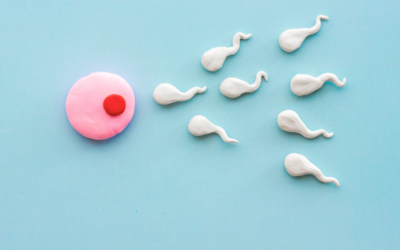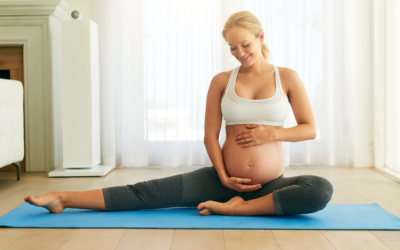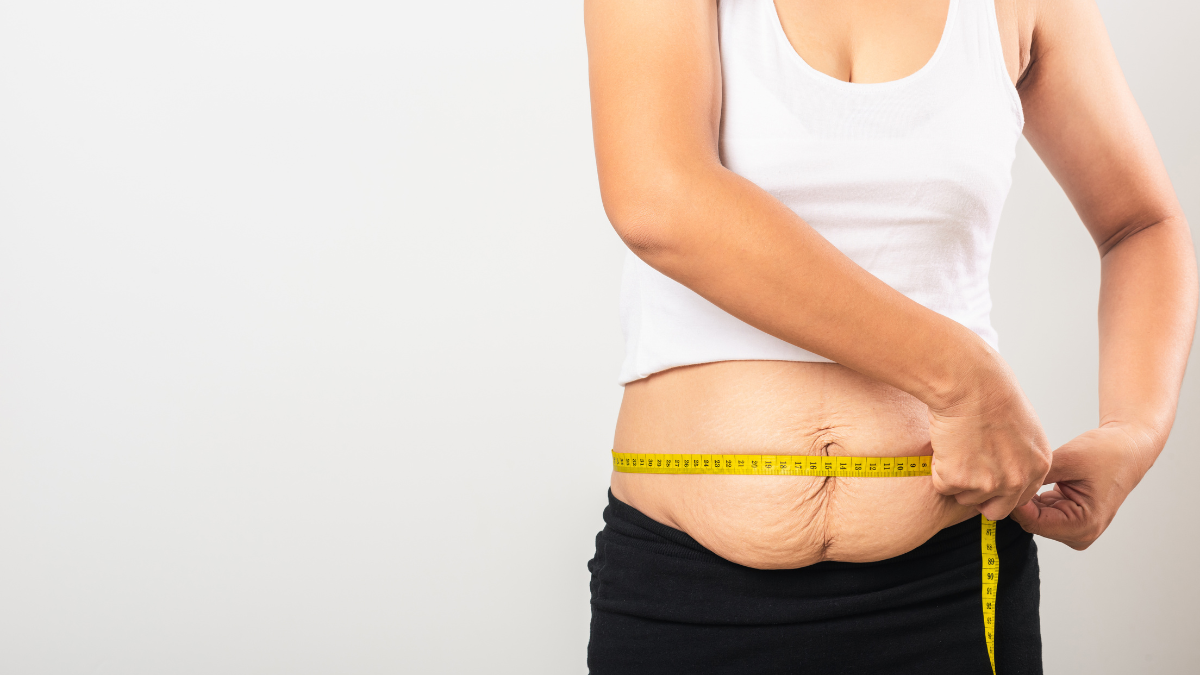Pregnancy changes everything—your body, your mind, your routine, and your priorities. After delivery, many new moms start thinking about one common goal: postpartum weight loss. While it’s completely natural to want to feel like yourself again, it’s just as important to approach this new phase with patience, self-love, and realistic expectations.
The truth is, postpartum weight loss isn’t about snapping back overnight or fitting into pre-pregnancy jeans. It’s about gently guiding your body back to balance—healing from childbirth, rebuilding strength, and feeling comfortable and confident in your own skin. With sleepless nights, constant feedings, and emotional shifts, it’s easy to put your own needs last. But taking care of your health helps you show up stronger—for both yourself and your baby.
In this blog, you’ll discover 15 smart and simple postpartum weight loss tips that are designed for real moms with real lives. No extreme diets, no pressure—just safe, supportive strategies to help you lose the baby weight gradually, nourish your body, and feel good along the way.
Whether you’re a few weeks or a few months postpartum, these tips will meet you where you are. Let’s dive into your recovery journey with kindness, knowledge, and the tools that truly work.
Table of Contents
What Does Postpartum Mean?
Postpartum refers to the period after childbirth, starting immediately after a woman gives birth and lasting for about six weeks to several months, depending on the context. It’s a time of significant physical, emotional, and hormonal changes as the mother’s body begins to heal and adjust to no longer being pregnant.
Key Points About the Postpartum Period:
- Begins right after delivery (vaginal or C-section)
- Often called the “fourth trimester”
- Includes the uterus shrinking back to its normal size
- Involves vaginal bleeding (lochia) as the uterus sheds its lining
- Hormone levels (like estrogen and progesterone) drop suddenly
- The body starts producing milk if breastfeeding
- Emotional shifts may occur, including the “baby blues” or postpartum depression
Common Changes in the Postpartum Phase:
- Sore breasts
- Vaginal or C-section healing
- Hormonal mood swings
- Fatigue and sleep deprivation
- Hair thinning
- Weight fluctuations
This phase is crucial for recovery, rest, bonding with the baby, and adjusting to motherhood. It’s also the period when many women begin thinking about postpartum weight loss, but the focus should always be on gentle healing and support.
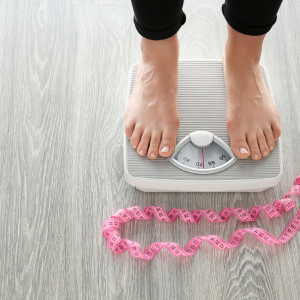
What Is Postpartum Weight Loss?
Postpartum weight loss refers to the natural and gradual process of losing the weight gained during pregnancy after giving birth. Most women gain between 11 to 16 kg (25 to 35 pounds) during pregnancy, and while some weight is lost immediately after delivery (mainly the baby, placenta, and fluids), the rest comes off more slowly over time.
This process isn’t just about looking a certain way—it’s about feeling stronger, healthier, and more energized in your new role as a mother. The key to successful postpartum weight loss is patience, balance, and consistency, not crash dieting or extreme workouts.
Your body needs time to:
- Recover from childbirth
- Rebuild hormonal balance
- Produce breast milk if breastfeeding
- Restore energy levels
- Heal from any physical trauma (especially C-section or perineal tears)
Many moms lose weight over the course of 6 to 12 months, but timelines vary. The focus should always be on nourishment, safe movement, hydration, rest, and emotional health.
Why Does Postpartum Weight Loss Matter?
Postpartum weight loss is about much more than just fitting back into your pre-pregnancy clothes. It matters because your body has gone through huge physical and hormonal changes—and losing the excess weight gradually can help you feel healthier, stronger, and more balanced both physically and emotionally.
Here’s why postpartum weight loss is important:
- Supports Long-Term Health: Excess weight after pregnancy can increase the risk of conditions like diabetes, high blood pressure, and joint pain if it isn’t managed over time.
- Boosts Energy Levels: Carrying extra weight can make you feel more tired, especially while caring for a newborn. Healthy weight loss helps improve stamina and reduce fatigue.
- Improves Mental Well-Being: Many moms feel more confident, positive, and motivated as they regain their strength and shape.
- Protects Future Pregnancies: Getting back to a healthy weight before your next pregnancy reduces the risk of complications like gestational diabetes or high blood pressure.
- Enhances Mobility and Comfort: Losing baby weight can make everyday activities—like carrying your baby, going for walks, or getting good sleep—more comfortable.
That said, postpartum weight loss should never be rushed or forced. Your body needs time to recover and heal. It’s not about getting “back” to your old self—it’s about becoming your healthiest self in this new chapter of life.
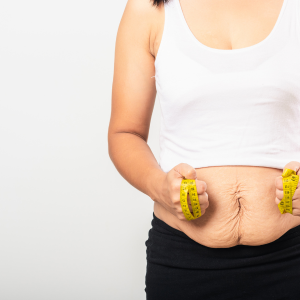
Benefits of Postpartum Weight Loss
Losing weight after pregnancy isn’t just about appearance—it’s about improving your overall health, energy, and confidence as you step into motherhood. When done gradually and safely, postpartum weight loss can offer several physical, mental, and emotional benefits that positively affect your day-to-day life.
Here are some key benefits of postpartum weight loss:
1. Increases Daily Energy
Shedding excess weight can help reduce fatigue and boost your stamina. With more energy, it’s easier to take care of your baby, move around, and feel motivated throughout the day.
2. Supports Mental Health
Many women report feeling more confident and emotionally balanced as they begin to regain their strength and shape. Healthy postpartum weight loss may reduce feelings of depression or low self-esteem, especially when paired with self-care and rest.
3. Reduces Risk of Chronic Diseases
Carrying extra weight long after pregnancy increases the risk of developing health issues like:
- Type 2 diabetes
- High blood pressure
- Heart disease
- Joint pain and inflammation
By gradually losing weight, you reduce these risks and support long-term health.
4. Improves Sleep Quality
Excess weight can interfere with sleep, especially if you experience breathing problems like snoring or sleep apnea. Even a small amount of weight loss can lead to better rest—something all new moms need.
5. Eases Physical Discomfort
Losing weight can relieve pressure on your back, knees, hips, and feet. This helps prevent chronic aches and pains, especially when you’re often lifting, bending, and carrying your baby.
6. Prepares Your Body for Future Pregnancies
Maintaining a healthy weight between pregnancies lowers the chances of complications like gestational diabetes, preeclampsia, and C-section delivery.
7. Sets a Positive Example
As your child grows, they’ll learn from your habits. Making health a priority early on shows them the value of balanced eating, movement, and self-care.
8. Enhances Posture and Core Strength
A lighter, stronger body improves posture, core stability, and pelvic floor health—key areas affected during pregnancy and delivery.
9. Boosts Immune Function
Healthy eating and exercise support your immune system, making you more resilient to postpartum illnesses and infections.
10. Builds Confidence in Your New Identity
Losing weight in a mindful, self-loving way helps you feel strong, capable, and proud—not just as a mom, but as a woman rediscovering her power.

How Long Does Postpartum Weight Loss Take?
The timeline for postpartum weight loss is unique for every mom. While some women may return to their pre-pregnancy weight in a few months, others may need a year or more. That’s completely okay. Your body just created life, and now it’s recovering.
Factors that affect postpartum weight loss include:
- Pre-pregnancy weight and BMI
- Amount of weight gained during pregnancy
- Type of delivery (vaginal or C-section)
- Breastfeeding status
- Activity levels
- Diet and hydration
- Sleep and stress levels
- Genetics and hormones
Why You Should Avoid Rushing Postpartum Weight Loss
Many moms feel pressure to “bounce back” quickly after birth, but this mindset can lead to unhealthy decisions. Rapid weight loss may affect your energy, milk supply, and mental health. Postpartum weight loss should be slow, safe, and focused on well-being, not appearance.
Here’s why patience pays off:
- Hormonal shifts take months to stabilize
- Breastfeeding demands energy and nutrients
- Your pelvic floor and abdominal muscles need healing
- Sleep is irregular, and your schedule is unpredictable
The Role of Breastfeeding in Postpartum Weight Loss
Breastfeeding burns an average of 500–700 calories per day. For some moms, this naturally supports postpartum weight loss. However, others may not notice significant weight change, especially if their body holds fat reserves to support milk production.
What to keep in mind:
- Eat nutrient-dense foods to support lactation
- Don’t cut calories too drastically
- Stay hydrated to support both milk supply and metabolism
- Prioritize quality over quantity in your meals
Safe & Effective Nutrition Tips for Postpartum Weight Loss
One of the most important pillars of postpartum weight loss is what you eat. Focus on nourishing your body with foods that support healing, energy, and fat burning—all without restricting too much or compromising your milk supply.
Best foods for postpartum weight loss:
- Lean protein: eggs, chicken, fish, lentils, tofu
- Whole grains: oats, quinoa, brown rice
- Healthy fats: avocado, olive oil, flaxseeds, walnuts
- Fruits & vegetables: especially leafy greens, berries, carrots, apples
- Probiotic foods: yogurt, kefir, kimchi for gut health
Foods to limit:
- Sugary snacks and sodas
- Ultra-processed packaged foods
- Fried and greasy meals
- Excess caffeine (if breastfeeding)
Postpartum meal ideas:
- Oatmeal topped with berries and almonds
- Stir-fried veggies with grilled chicken and brown rice
- Smoothies with spinach, banana, yogurt, and chia seeds
- Lentil soup with whole wheat toast
- Hummus with veggie sticks and boiled eggs
The Importance of Hydration in Postpartum Weight Loss
Water plays a crucial role in postpartum recovery. It aids digestion, reduces water retention, supports milk production, and helps flush toxins. Staying hydrated also prevents overeating, as thirst is often mistaken for hunger.
Tips to stay hydrated:
- Keep a water bottle within reach at all times
- Drink a glass before and after every feeding session
- Add lemon, mint, or cucumber for flavor
- Track water intake with an app or journal
Aim for at least 2.5 to 3 liters (10–12 cups) of water daily. Drink more if you’re breastfeeding or sweating due to summer heat or workouts.
Exercise and Movement for Postpartum Weight Loss
Exercise is key to postpartum weight loss, but your body needs time before jumping back in. Most women can resume light activity like walking after a few days, but intense workouts should wait until 6 weeks post-delivery or 8–10 weeks after a C-section, with doctor approval.
Start slow with:
- Gentle walking indoors or outdoors
- Postnatal yoga or stretching
- Pelvic floor exercises (Kegels)
- Deep belly breathing to activate core muscles
Progress gradually to:
- Resistance bands or bodyweight training
- Low-impact cardio like swimming or cycling
- Postnatal fitness classes (online or in-person)
Why exercise matters for postpartum weight loss:
- Boosts metabolism
- Increases energy
- Tones muscles
- Reduces stress
- Improves sleep quality
Getting Enough Sleep: A Hidden Key to Weight Loss
Sleep deprivation is common for new moms, but it plays a major role in postpartum weight loss. Lack of sleep increases cortisol (stress hormone), which triggers cravings and slows fat-burning.
Tips to maximize sleep:
- Nap when your baby naps
- Skip chores and rest instead
- Share night duties with your partner
- Avoid screens before bedtime
- Limit caffeine in the afternoon
Even if you can’t get 8 hours at once, short naps and rest breaks help your body reset.
Managing Stress and Emotional Eating
New motherhood is joyful, but also emotional. Many moms eat to cope with anxiety, loneliness, or exhaustion. Emotional eating can slow down postpartum weight loss and create guilt.
Healthier ways to manage stress:
- Practice deep breathing or meditation
- Journal your feelings
- Call a friend or join a support group
- Take short walks outdoors for a mood boost
- Seek therapy if overwhelmed
Give yourself grace. You’re navigating major life changes.
Supplements That May Support Postpartum Weight Loss
While food should be your primary source of nutrition, some supplements help new moms recover and manage weight.
Common postpartum supplements:
- Postnatal multivitamins
- Omega-3 fatty acids
- Vitamin D
- Iron (especially if blood loss occurred)
- Probiotics
- Collagen for skin and joint health
Always consult your doctor before starting new supplements, especially while breastfeeding.
Postpartum Weight Loss: 15 Smart and Simple Tips
1. Don’t Rush the Process
Give your body time to heal. It’s normal to hold onto some weight after giving birth. Focus on recovery first, then gradually shift toward your postpartum weight loss goals when your doctor gives the go-ahead (usually after 6–8 weeks).
2. Start with Gentle Movement
Begin with light activities like walking, stretching, or postnatal yoga. Movement improves blood circulation, boosts mood, and supports metabolism without straining your healing body.
3. Breastfeed If You Can
Breastfeeding can burn 500–700 calories a day. It supports postpartum weight loss naturally while also helping your uterus shrink back to its original size.
4. Stay Hydrated
Water is essential for fat metabolism and helps reduce bloating. Aim for 8–12 glasses a day, especially if you’re breastfeeding.
5. Eat Whole, Nutrient-Rich Foods
Focus on foods that nourish:
- Lean protein (chicken, lentils, eggs)
- Whole grains (brown rice, oats)
- Fruits and veggies
- Healthy fats (nuts, seeds, avocados)
These support energy levels and postpartum weight loss without restricting your body’s needs.
6. Avoid Crash Diets
Extreme diets can reduce your milk supply and slow recovery. Instead, aim for a slow, steady weight loss of 0.5–1 kg per week. That’s healthy, realistic, and sustainable.
7. Sleep Whenever You Can
Lack of sleep increases cortisol, which promotes fat storage. Take naps when the baby sleeps—even short rest breaks can support your body’s natural weight balance.
8. Prioritize Protein
Protein helps you feel full longer and supports muscle repair, especially if you’re exercising. Include protein at every meal to aid postpartum weight loss.
9. Manage Stress Levels
High stress can increase emotional eating and slow metabolism. Try deep breathing, meditation, short walks, or simply asking for help when needed.
10. Practice Core-Friendly Exercises
Rebuild your core with safe postnatal moves like pelvic tilts, modified planks, and breathing-based ab exercises. Avoid crunches early on if you have diastasis recti.
11. Make Smart Snack Choices
Choose high-fiber and protein-rich snacks like:
- Greek yogurt with berries
- Apple slices with peanut butter
- Boiled eggs and hummus
These keep you full and reduce sugar cravings.
12. Keep Healthy Foods Visible
Keep fruit on the counter, chopped veggies in the fridge, and junk food out of reach. Making healthy choices easy supports your postpartum weight loss goals.
13. Use a Small Plate
Portion control can help avoid overeating, especially when you’re distracted or eating on the go. Smaller plates encourage mindful eating and help manage calorie intake.
14. Track Progress—Not Just the Scale
Your weight is just one part of the picture. Track inches lost, how your clothes fit, energy levels, or even your mood. These wins matter just as much.
15. Be Patient and Kind to Yourself
Every mom’s journey is different. Postpartum weight loss isn’t a race. Celebrate every small step and remember: taking care of yourself is a part of taking care of your baby.
Common Postpartum Weight Loss Mistakes to Avoid
- Comparing your body to others
Every mom’s journey is unique. What works for one may not work for another. - Skipping meals or dieting harshly
This backfires by slowing your metabolism and lowering milk supply. - Ignoring sleep and stress
Fatigue and anxiety are major blockers for weight loss. - Doing the wrong workouts too soon
High-impact movements too early can hurt your core or pelvic floor. - Focusing only on the scale
Real results show up in energy, mood, and strength.
Sample 7-Day Meal Plan
Here’s a simple, nutritious meal plan for postpartum moms:
Day 1:
Breakfast: Oatmeal with berries & almonds
Lunch: Quinoa salad with grilled chicken & veggies
Snack: Greek yogurt with honey
Dinner: Lentil soup with brown rice
Day 2:
Breakfast: Smoothie with spinach, banana, flaxseed
Lunch: Stir-fried tofu with rice noodles
Snack: Apple slices with peanut butter
Dinner: Baked fish with sweet potatoes
Day 3:
Breakfast: Whole wheat toast with avocado & boiled eggs
Lunch: Chickpea curry with millet
Snack: Handful of walnuts
Dinner: Chicken stew with carrots and peas
(Repeat or mix as preferred for 7 days. Keep portions moderate and balanced.)
Final Thoughts on Postpartum Weight Loss
Your body just did something miraculous—it brought life into the world. So when it comes to postpartum weight loss, give yourself grace, patience, and time. This journey isn’t a race or a punishment. It’s about healing, rebuilding your strength, and finding a new rhythm in this beautiful chapter of motherhood.
By focusing on small, consistent steps—like nourishing your body, moving mindfully, staying hydrated, managing stress, and getting rest whenever you can—you’re setting yourself up for success. Every mom’s journey is unique, and there’s no single timeline or magic number. The most important thing is to feel strong, healthy, and confident in your own skin.
Remember, postpartum weight loss isn’t about bouncing back. It’s about moving forward—feeling better, living better, and loving the amazing woman and mother you are today.
You’re doing a great job, mama. Trust your body, stay consistent, and celebrate every little win along the way.

